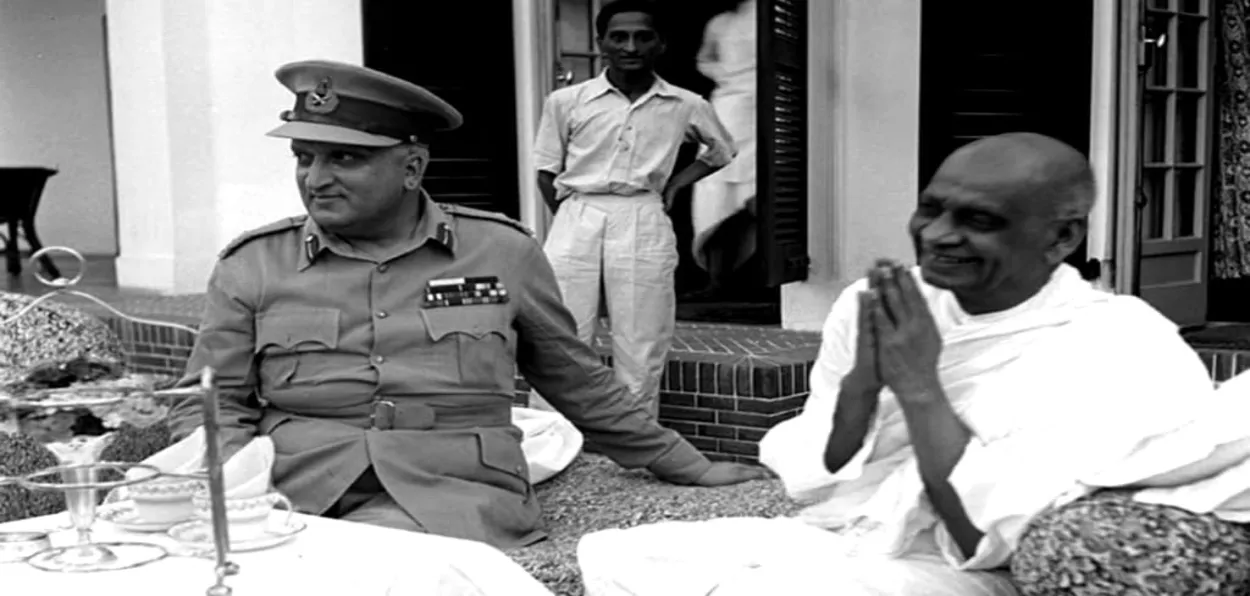
Aasha Khosa/New Delhi
Sardar Vallabhbhai Patel, called India’s Iron Man for his dexterity in cobbling modern-day India by uniting all the 556 principalities, kingdoms, and feudal states, including the defiant ones like Hyderabad, Junagarh and later Goa, was instrumental in sending the Indian army to Srinagar well in time to save the state from falling into Pakistan’s fold.
"Jawaharlal, do you want Kashmir, or do you want to give it away?" The quote is from a recorded video interview of Field Marshal SAM Manekshaw, who was serving in as a Leiutenant Colonel in planning role at the Military Directorate in Delhi, at that time.
Manekshaw is narrating a heated argument in 1947, where Sardar Patel confronted PM Nehru about his indecisiveness regarding Kashmir's accession following the Pakistani attack on Kashmir on 22 October 1947.
“As usual, Nehru talked about the United Nations, Russia, Africa, and God Almighty, everybody, until Sardar Patel lost his temper. He said, ‘Jawaharlal, do you want Kashmir, or do you want to give it away?’ He (Nehru) said, ‘Of course, I want Kashmir’ (emphasis in original). Then he (Patel) said, ‘Please give your orders.’ And before he could say anything, Sardar Patel turned to me and said, ‘You have got your orders’.” Sam Manekshaw said in the video interview available on the internet.
According to the latest book, 370 Undoing the Unjust: A New Future for J&K by BlueKraft Digital Foundation, Nehru knew that Pakistan was mobilising its army and tribesmen to attack Kashmir, but delayed both accession (of J&K) and sending the Military when the Maharaja Hari Singh (Father of Indian politician Dr Karan Singh) sent an SOS to Delhi.
In that meeting, when Nehru affirmed that he wanted to keep Kashmir, Patel immediately ordered the Indian Army to act, leading to the deployment of troops before Nehru could issue further orders.
The Military writers say that had it not been for Patel’s intervention, the raiders would have run over the Srinagar Airport, leaving no place for the Indians to land in Srinagar and push the hybrid army of regulars and Tribesmen from Khyber Pakhtunkhwa back..
Indian Army Sikh Battalions landed in Srinagar on October 27, a day after the Maharaja Hari Singh signed the instrument of accession with India, and saved Kashmir.
Earlier, Nehru had refused to accept Maharaja Hari Singh’s proposal of joining the Indian domain by placing several preconditions before him.
Jammu and Kashmir was the only territory where Patel did not interfere in incorporating it into India due to Prime Minister Jawaharlal Nehru’s personalised approach. Nehru’s obsession with the land of his ancestors and his approach of linking accession to his friendship with Sheikh Mohammad Abdullah were in stark contrast to Patel's pragmatism.
Patel kept an eye on Nehru but did not interfere in J&K till the state was about to fall to the Pakistanis.
After Patel finally put his foot down on Nehru’s ways, a team flew to Kashmir to make Hari Singh sign the instrument of accession on the late evening of October 26 and the first flight of Sikh soldiers landed at Srinagar the next day. The raiders were defeated in no time, and a large territory north of Srinagar was reclaimed.
Next came an occasion when PM Nehru had to announce the terms of accession of J&K to India to the Indian public. He had arrived at an understanding with everyone, including Patel, on the script of his speech.
However, Nehru, under the influence of Lord Mountbatten, changed the script at the last minute. He was to announce that accession of J&K would be conditional and contingent on the plebiscite under the UN auspices.
370 Undoing the Unjust: A New Future for J&K says, “Just minutes before Nehru's scheduled speech on the evening of 28 October, Sardar Patel, recognising the embarrassing commitment, attempted to intervene.
“Sardar Patel's efforts, however, were futile, as Nehru had already left for the Broadcasting House. As a last resort, Sardar Patel sent Shankar to the Broadcasting House to ask Nehru to omit the phrase referring to the UN. However, the speech had already started by the time Shankar reached the Broadcasting House, and the commitment had been made.”
Patel was aghast at this because the plebiscite was not incumbent upon India, as Pakistan was supposed to withdraw its troops from POK at the first instance.
ALSO READ: Sardar Patel was against the ghettoisation of Muslims
Nehru’s messing up what would have been a simple statement made India face an ambiguous situation for the next seven decades on Kashmir. It left the issue of Kashmir's accession to J&K hanging fire in the minds of the locals, gave fodder to the international community to question India and led to Pakistan waging multiple hybrid proxy wars against India.
